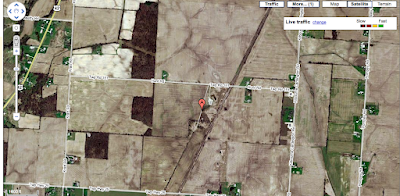 The website for Urso Construction LLC is a holding page (no content) but owner James Urso's storm-chasing marketing in Ohio attracted attention from the local newspaper. This is a Google maps image of where the business is located.
The website for Urso Construction LLC is a holding page (no content) but owner James Urso's storm-chasing marketing in Ohio attracted attention from the local newspaper. This is a Google maps image of where the business is located.This Google News alert under the keywords "construction marketing" caught my eyes last night. In Roofer Offers Unusual Marketing Ploy the Port Clinton, Ohio News Herald reports:
The story proceeds to describe how her insurance representative thought the offer was fraudulent, then the company's owner, James Urso, who said the company is not replacing just any roof.DANBURY TOWNSHIP -- When an out-of-town construction company began distributing flyers and knocking on doors in several area neighborhoods recently, some people became suspicious.
Urso Construction LLC, based in Cardington, about 40 miles north of Columbus, ran a full court advertising press promoting new roofs at no cost to homeowners.
Sue Cunningham, a Danbury Township resident who lives in the Perrysburg Estates subdivision, said she was suspicious.
"We had numerous visits and also cards and flyers," she said.
Specifically, he said, they will replace roofs damaged during a severe wind and hailstorm that occurred June 25.
"This is one-hundred percent legit," Urso said. "I'm just doing what other contractors aren't."
Well, of course, some others are -- this is the business of "storm chasing", noticing where a hail storm is likely to cause roof damage, and then moving into the marketplace with aggressive marketing to encourage homeowners to file insurance claims. Provisions in Ohio insurance law make this ploy both rational and practical, as in storm-damaged areas, insurance claims cannot affect your coverage or ratings. In other words, if you qualify, and there really is storm damage (often invisible to the naked eye), the contractor can get the insurance company to repair or replace your roof, for "free".
Fair enough. I learned about this stuff during my visit to Ohio last November, and a recent posting by Ed Falko on contractortalk.com puts the storm chasing game in a less-than-positive light (though it is clear that Urso Construction is an honorable business and delivers the services it promises (and will be around to serve its clients in the future.)
Compare "storm chasing", however, to the processes involved in winning most significant construction contracts or business. You'll find the market divided into two groups: the frequent, repeat users of construction-related services and the occasional client, who might need a one-time major project.
Frequent users usually have a combination of sophisticated procurement procedures and rules and lots of hidden rules, based on experience and relationships. You'll certainly find that in much government work -- sure, the opportunities may be "open" to anyone who qualifies, but you are much more likely to win if you have a solid track record and get along with the individuals running the department.
Occasional users, whether they be for major residential remodels, or a business expanding to a new location, are harder to find at the early stages of the decision-making curve. In any case, they are generally not going to rush their decisions: They will listen to trusted advisers, friends, colleagues, and others before believing anything you say. Sometimes, friends give them bad advice, but it is "more right" than your perceived self-interest. Here, you need relationships with the people with the key relationships to make things happen.
Is "storm chasing" (done ethically) bad? Of course not, but you will need to travel in spaces which make many people uncomfortable. Yes, you probably need a hard-rock canvassing crew to succeed.
Is relationship-building and finding lucrative projects involving scale and scope, what you want to do? For most readers here, it is. The challenge, as I've discussed over the past couple of years, is that I cannot give you a one-size-fits-all-universal-solution-that-you-can-implement-in-10-minutes.
Then again, look at the start of this posting: A news article in a local publication. James Urso certainly didn't seek out the news coverage, which isn't totally flattering, but at least gives his side of the story. But what if Urso had been pre-emptive and thought of ways to connect with the news media in his area before the reporter called? (And does he have a proper website for his business?)
I sense that for many people in the construction industry, media relations and publicity are true "sleeper" marketing resources. Probably few contractors use these resources because they are uncertain (you cannot control how or when the media will report on your business -- though you can influence the decisions), and require everything else to be in good order first: Your service quality, reputation, and marketing collateral including website and follow up systems need to be in place before you even think of seeking out publicity.)
But the main thing is probably lack of knowledge. Here, while I may not know how to shingle a roof and have no interest in chasing storms, I can help.



0 comments:
Post a Comment